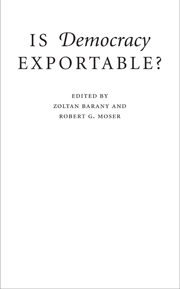Conclusion: Is Democracy Exportable?
Published online by Cambridge University Press: 05 June 2012
Summary
Whether we assess the evidence from the essays in this book or from examples in the world around us, we are forced to conclude that democracy is not exportable. Export involves crafting a product in one location, finding a buyer willing to pay for it in another location, and conveying it intact. Democracy simply does not fit the metaphor. First, democracy is not a singular product, but a complex set of institutions and behaviors that can only be put in place by local individuals acting on their own accord. Second, democracy has no single local buyer. Many may seek it, but their visions of its institutional composition will vary, and many pivotal local actors may not seek democracy at all. Indeed, these actors may be willing to pay a high price to prevent democracy and, thus, make the costs of creating democracy too high even for those who desire it dearly. Finally, institutions rarely journey from one setting to another unchanged. Forms might remain the same, but content and function will vary dramatically.
The ever present problems with the export model have been exacerbated by the war in Iraq. Although, as Marc Plattner points out, attempts to establish democracy through invasion have been “exceedingly rare” (Plattner, this volume), the Iraq war is still seen by many as emblematic of the West's, or more specifically, the United States' export efforts.
- Type
- Chapter
- Information
- Is Democracy Exportable? , pp. 242 - 264Publisher: Cambridge University PressPrint publication year: 2009
- 8
- Cited by



